Also welcome to my AAR, Johhog. I hope you enjoy it and should you have any questions feel free to ask. I'll be happy to answer anything.
Hungary's Rise to Power
- Thread starter EtzelHoveri
- Start date
-
We have updated our Community Code of Conduct. Please read through the new rules for the forum that are an integral part of Paradox Interactive’s User Agreement.
You are using an out of date browser. It may not display this or other websites correctly.
You should upgrade or use an alternative browser.
You should upgrade or use an alternative browser.
Chapter 9: General Meszaros' War
King Karoly III had been murdered, Bela had taken the throne, Vencel Bathory was banished to Greece, General Simon Meszaros has been named Guardian of Hungary, and the capitol has been moved from Pecs to Cantabria. And all of this had occurred in just the last month. With his return to Iberia the new King took with him an army of 20,000 men from Pecs. Leaving the boats on the 14th of June 1455 by the 17th they were already moving south against Portugal. Of all the great powers that had allied themselves with Portugal only the Scots had the guts to try to take on the Hungarian army.
Arriving in Porto at the beginning of July, King Bela and his army quickly took the city before moving on to the rest of northern Portugal. At this time the Portuguese army was busy building a colony in Africa so city by city fell until all of northern Portugal was in the King's grasp. This campaign however had to end mid-August when word came that a Scottish army of 7,000 men had landed in Cantabria and in the east the Ottoman Empire had issued a Jihad against his Hungarian lands. The Ottoman's he didn't worry about to much since they would have to face off against General Meszaros but he feared that Cantabria would abandon his command. So on the 26th of August he made peace with Portugal saying he would return all their lands except for Porto which they were happy to accept.
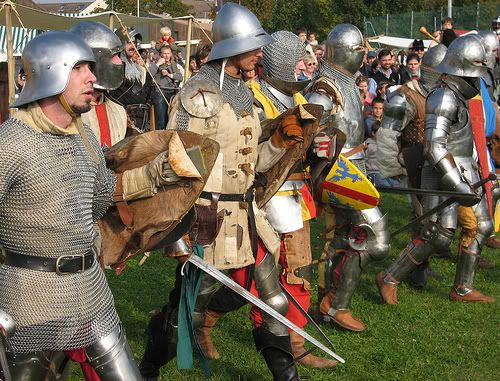
Hungarian Army moving to deal with the Scots.
It took him until December to get back because of the weather but when he did arrive the Scots quickly fell to the Hungarian sword. Leaving only one man alive King Bela sent him back to his King telling him that if they did not make peace then he would send his army to deal with him. So on the 1st of the new year the Scottish King made peace to avoid the wrath of the Hungarian army which had been considered the best in the world following their victory against the Castilians.
Hearing of this peace the Sultan of the Ottoman's also fearful of the wrath of the new King informed his men that there would be no great Jihad against the Hungarians. They were still to powerful and he would not let his men die for no reason if he could help it. And so the Ottoman's great holy war was ended without a single soldier crossing the Sea of Marmara on either side.
As all this was going on General Meszaros did nothing but enjoy his new position. From a banished General he had moved up to taking over the position of the former King Karoly with a stab of his spear. However this soon began to bore him greatly since he was a man of action. He missed the field of battle and the Ottoman's little teaser the year before had done nothing to quench his thirst for battle. Sadly for Vencel Bathory this was the same time he decided to move from Greece to the land of Montenegro where he had friends and relatives. This action the paranoid General Meszaros took as a threat and marched south with a force of 15,000 men. He then ordered the King of Montenegro that he was going to removed Vencel Bathory from Hungarian lands as he was forbidden from them. The King tried to argue that his lands were not Hungary's but in the end he gave up and Montenegro officially became one of their vassal states.
Pleased with another success against his former commander's son, General Meszaros returned to Pecs and enjoyed the good life while the Hungarian people suffered under him. They were growing tired of warfare and their new leadership but there wasn't anything they could do as whenever even the smallest of groups came together the Hungarian army was soon to follow. The Hungarian people's problems grew even more when General Meszaros decided to declare war against Venice. Even though Venice had not broken the agreement made with King Sigismund in 1414, General Meszaros believed that they did not deserve to have lands in the Balkans.
This enraged many of the powers of northern Italy and so Genoa, Cyprus, Naxos, Ulm, and Avignon all declared war on Hungary who only had the support of their vassal states of Montenegro, Bavaria and Lorraine. The rest of the Hungarian allies informed King Bela that they could not fight with a man who would allow his General's to dictate wars for no reason except for his pride.
At first General Meszaros had planned on moving against the Venetian controlled Greek mainland but when word came that the Genoians were going to fight in this war he had to face them. So instead he sent Ulaszlo Andrassy with an army of 10,000 men to deal with the Greeks while he marched into Edirne to fight the Genoa army of 21,000 battle hardened soldiers. Against such a large force he only brought with him his army of 13,000 men who had been with him for nearly eighteen years now since his attack against Bosnia in 1441. These men had been tested time and time again and each time they walked away victorious. For nearly two months these men fought back and forth with the Genoians, until finally General Meszaros was able to make one last push against them and crushed their forces.
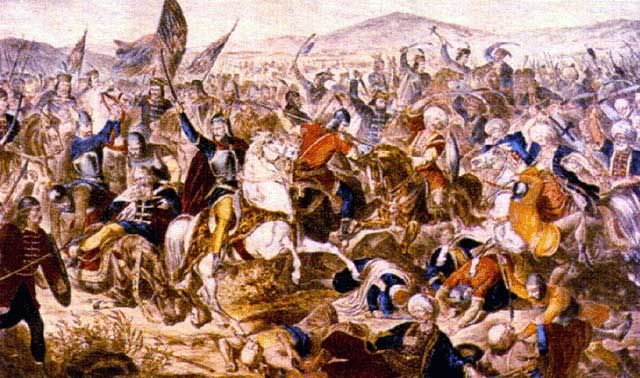
General Meszaros and his army facing the Genoians who greatly outnumbered them.
With the Genoian forces routed the General decided to first take Macedonia since Ulaszlo had left the city as he moved further south past Albania into the heart of Greece. After capturing this city he decided to give his men a short rest before offering the Venetians a chance to get out of this war. Word had come that the Genoians were preparing another army and he knew he could not face them with only his 13,000 tired and worn soldiers. He would need Ulaszlo's men who had proven greatly successfully against the Greeks. And so on the 2nd of May 1460 peace was made with both Ulm and Venice. Venice agreed to cede Albania and Macedonia while Ulm agreed to not send any soldiers against them.
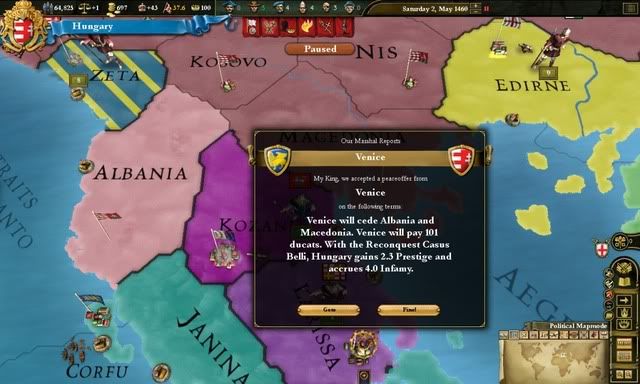
Returning to General Meszaros with his 10,000 men General Andrassy was greeted with cheers and applause. He had taken a small force of new recruits and had taken all of Greece in a matter of a few months. When he was questioned on how he had done such a feat he informed his commanding officer that when he first arrived in Albania he was greeted by a single traveler. This man turned out to be Vencel Bathory who had in his possession detailed maps of all of Greece and reports on the locations of all patrols, soldiers, and anything else a General could hope for. Using these things he was able to easily capture all of Greece. Once his retelling had been finished General Andrassy was shocked to see General Meszaros come towards him and strike him across the face. He was then removed from his command and banished as well for consorting with the enemy.
With his army bolstered to 23,000 men General Meszaros left the former General without horse, food or any other possessions as he marched east to Edirne again. Arriving on the 24th of August 1460 he had the city in his control by the 11th of September before moving on to Thrace and Constantinople. This city took a little longer to take but still by the 26th of October this land was his as well. Now it was just time to wait for the Genoian navy to arrive bringing the army that he had been looking so forward to fighting.
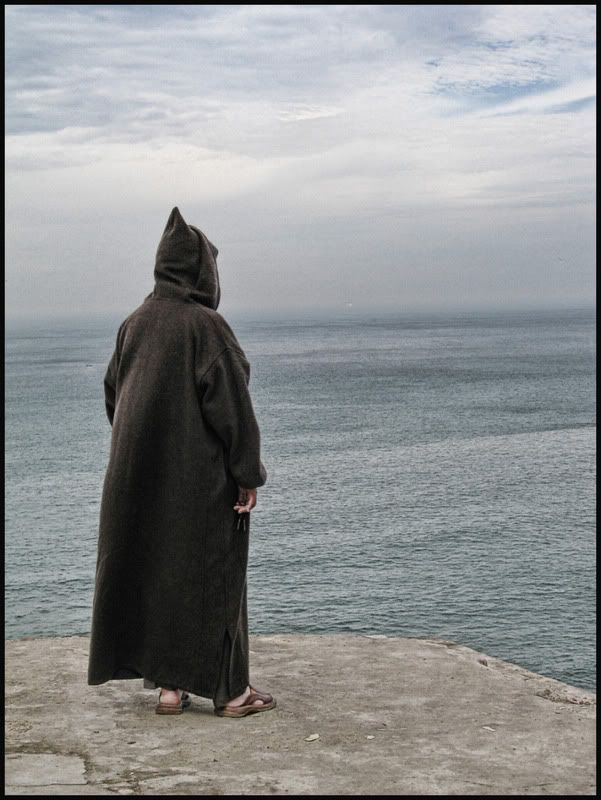
General Meszaros waiting for the Genoian navy.
As General Meszaros waited through the winter the King decided to use this time to take an army of twenty-nine thousand men and march them from Cantabria, through first Aragon controlled northern Castille, Aragon itself, and then southern France to attack Avignon. This trip took many months and many men died from either the travel or the weather but in the end Bela arrived outside of Avignon with an army of 17,000 men at the beginning of April. These men quickly swarmed the castle and for a month the castle held till finally on the 26th it was under Hungarian rule. Bringing the leader of the city Bishop Gregorius XII before him King Bela V forced the Bishop to bow before him and kiss his feet or be killed and all of his people would be killed. Do as the King asked he ended up swearing fealty to the King and Avignon joined amongst Hungary's other vassals as well.
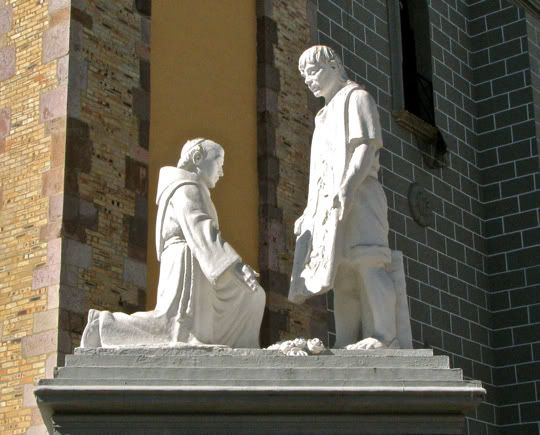
Modern day statue of Bishop Gregorius XII preparing to kiss King Bela's feet in Avignon.
Still waiting for the Genoian navy to arrive with his chance at glory, General Meszaros was greatly insulted when instead a single messenger arrived from the Genoian people requesting peace. Instead of agreeing the General killed the messenger and prepared to march west to the Genoian capital but the Genoian people then sent a messenger instead to King Bela who had returned to Cantabria and he was willing to see wisdom in this case and on the 29th of November 1461 the war was over. Greatly depressed by this General Simon Meszaros returned to Pecs where he wallowed in misery.
Chapter 10: Excommunicated
Following his little stunt with the Bishop of Avignon the Pope thought long and hard on what he should do with the Hungarian King. Should he declare open war against him? Command him to release Avignon from his grasp? Finally in July of 1462 the Pope was finally swayed by Sicilian Cardinals for him to be Excommunicated from the church. Even though his brother and father had proven their loyalties by bringing war to the Ottoman's and bringing most of the Balkans to the one true faith the Pope could not but agree that King Bela V was not a holy man. He would pay for his actions.
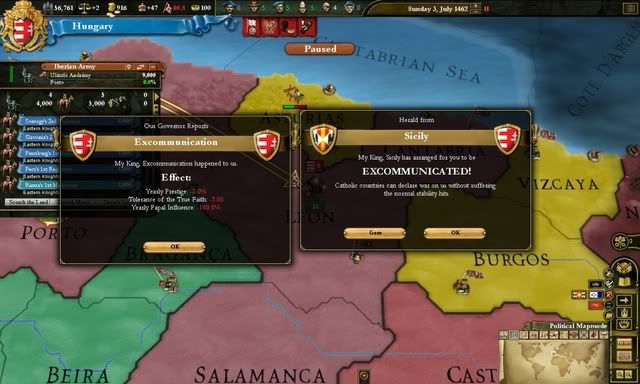
Even though he was no longer considered to be a good man he was still one of the most powerful men in all of Europe. So he cared little for what this one man thought of him, even if he was supposed to be the messenger from God. In Hungary itself the region was growing more and more ragged from their new leadership. General Meszaros was becoming quite paranoid in his advancing years and many people were being beaten randomly because the General had a dream about them or he looked at him funny. It was not a good time to live in mainland Hungary and for that matter it was not a good time to be living in the Iberian controlled Hungary either.
Following a rather bad winter in Pecs the General Meszaros became very ill. His lack of sleep and his constant state of agitation made him more assessable to illness which hit him hard in the year 1463. Bed ridden for close to four months he finally passed in the night in early April leaving the country back in the direct hands of Bela V. Before he could appoint a new Guardian of Hungary, Vencel Bathory and Ulaszlo Andrassy returned from Naxos where they had been living since the Venetian conflict three years before. Arriving in Pecs Vencel Bathory quickly took command of the city and made himself the de facto ruler. King Bela had originally planned to remove Vencel Bathory but in the end he decided to make him Guardian of Hungary since he was certain the area would need a powerful General in the years to come.
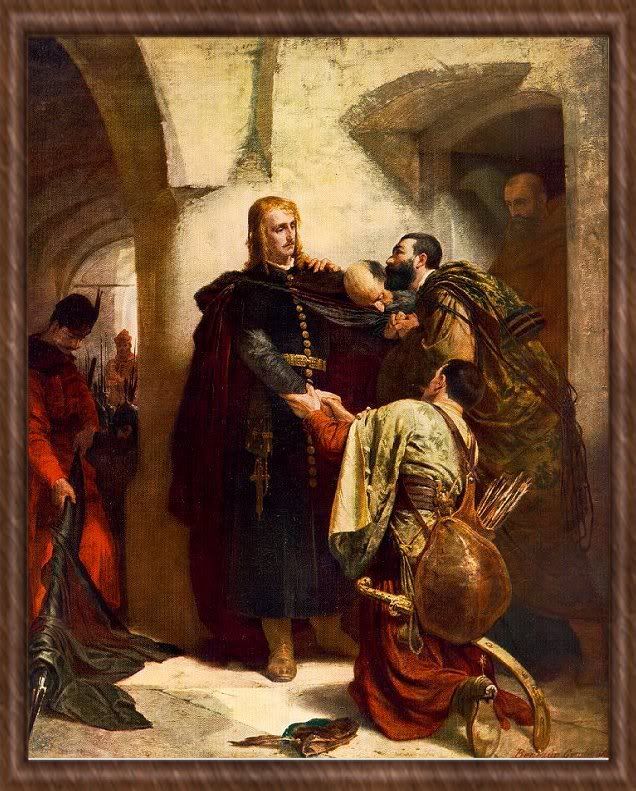
Vencel Bathory's return to Pecs.
Vencel's first command was to reorganize the military and rebuild the local infrastructure. Over the next few years many roads, buildings, and ports were rebuilt which brought about more jobs and brought in more wealth to Hungary's coffers which had been depleted over the years. He then sent General Andrassy to Iberia to 'serve' the King when in fact he was spying on him and giving Vencel monthly reports on his actions. As time was going on word finally came to him in October of 1465 from the King telling him to bring war to Austria as the people of Graz who were mostly Hungarian should be lead by a Hungarian King.
Enjoying his position as Guardian of Hungary, Vencel could not help but accept this request and so declared war against Austria and Silesia that November. He sent an army under one of his lesser commanders to deal with Austria as they had been plagued by rebels and bandits for years now and the country was on the brink of collapse while he marched north with his force of 10,000 men to deal with the Silesians. Both of these campaigns went very well for them and by January all of Silesia was under Vencel's command and Graz, Wien, and Linz had all fallen to the Hungarians as well. It was then that word came from the King that Portugal had decided to call for a Holy War against the Hungarian people to depose him. Joining this conflict was Bohemia and Scotland both major powers in the Catholic faith. In need of his entire military to face against the Emperor of Bohemia, Vencel convinced the Habsburgs of Austria to cede Graz which freed up another 10,000 men he could use in Bohemia.
Leaving Silesia Vencel Bathory attacked northern Bohemia while his army moved from Linz, Austria to begin attacking southern Bohemia. As the war in the east had begun war in the west was going even better. Already King Bela had destroyed two armies that had arrived by ship from Scotland and had begun his march south into Portugal. With winter setting in though he decided to stay in Braganca for the winter which would allow him to cut off any Portuguese army that tried to march past him to attack his lands. This war ended at the beginning of 1467 though when first the Emperor dropped out of the war and then Scotland. With no allies left the Portuguese King canceled his campaign against the Hungarians.
Returning to Cantabria King Bela was met by a messenger from the Queen Christina I von Luxemburg of Sweden. It appeared that the country was in revolt and trying to depose her and place a Swedish noble on the throne instead since Bela was considered such a bad person then all of the Luxemburgs were being considered bad people. He had offered to send an army to deal with this rebellion of hers but she refused and instead he sent a large chest of gold to help her fund her own force to deal with her people.
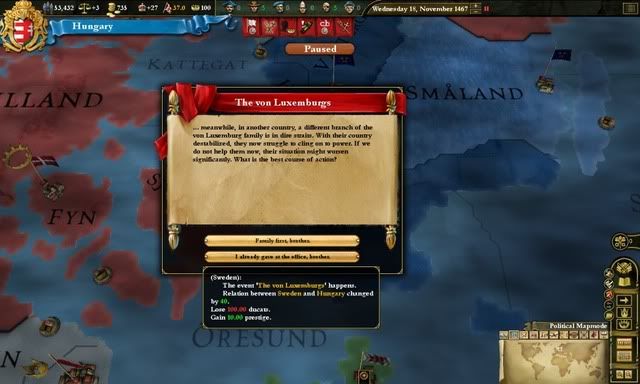
Von Luxemburg power begins to collapse further in on itself.
With peace returning to the Hungarian lands the armies were rebuilt, increased in size to the point that they now numbered 75,000, and reorganized. Hungary was split into four districts each guarded by a force of 10,000 soldiers and Iberia was split into two regions as well. The western portion of Porto and Galacia was guarded by General Andrassy and his force of 15,000 and the eastern portion of Cantabria, Leon and Salamanca would be defended by the Royal Iberian Army of 20,000 men led by King Bela V himself. This reconstruction came at just the right time because in June 1471 Vencel Bathory passed away leaving Hungary into a state of turmoil again. The minor rebellions that broke out though were easily able to be quelled though but the mainland Hungary was again not under any guidance. Vencel Bathory was then buried with his father both of which had proven time and time again that the Bathory family was one of honor and loyalty.
With nobody else to really take over Hungary, King Bela decided to send General Andrassy to take over Vencel's old position. Right after he left the Portuguese took this opportunity to attack again. For the third time in twenty years the Portuguese army were decimated by the Hungarian forces and all of Portugal up to Lisboa was captured by King Bela V. Growing tired from the conflict with the Portuguese he returned north but decided to keep Braganca to himself as this would let him keep an eye on them and make it harder for them to attack him.
In Hungary General Andrassy was not much of a leader but he did have a way with words. And so in 1474 he started three rebellions. The first was a man by the name of Viktor von Riediesel who he spurred into trying to claim the Austrian throne for himself with an army of 10,000 men. The next was a man by the name of Anton von Schanburg who brought an army of 8,000 rebel peasants to aid Viktor in his quest for taking the Austrian throne. The last of these rebellions was not very successful because these men came to him and it wasn't General Andrassy going to them. The only thing this rebellion did was enrage Archbishop Niccolo II of Aquileia.
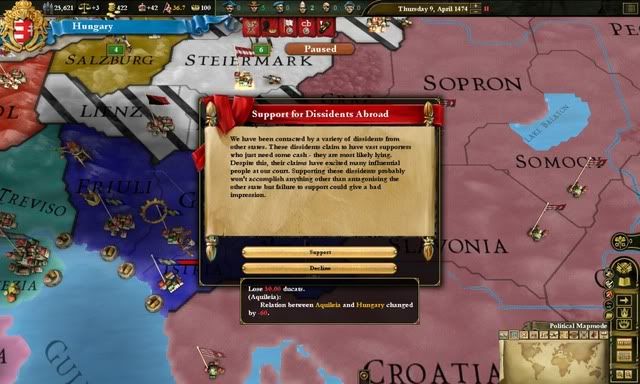
General Andrassy's failed Rebellion.
In 1476 the plague had arrived on the Iberian peninsula. It began in Galacia which was the major trading port of the Hungarian lands but soon spread across the rest of their lands. This disease was killing thousands upon thousands of people but for some reason King Bela did not try to leave to Hungary. Word began to spread across all of Europe that this was God's punishment on King Bela as the disease only spread through Hungarian lands and did not go into Portugal, Castille or Aragon. Finally on March 17th, 1481 King Bela V von Luxemburg died from the plague. Upon his death nobody came to pay homage to their fallen King except for his wife and one servant.
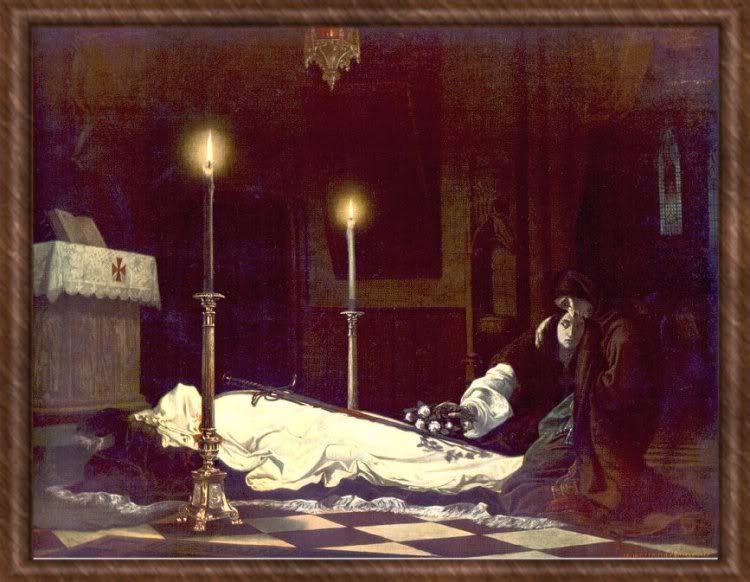
Bela V's reign has come to an end.
I should have the next post up either tonight or tomorrow hopefully. Been busy with school work and haven't had the time to post my next update.
I'm glad you are excited but I fear that the next couple of updates are pretty boring. No great wars for close to twenty years and that one is pretty short. The next really good ones don't occur until late 1520s to mid 1530s. After Karoly and Bela's little conquering spree it will take some time to rebuild Hungary I fear.
Chapter 11: Andras IV takes the throne
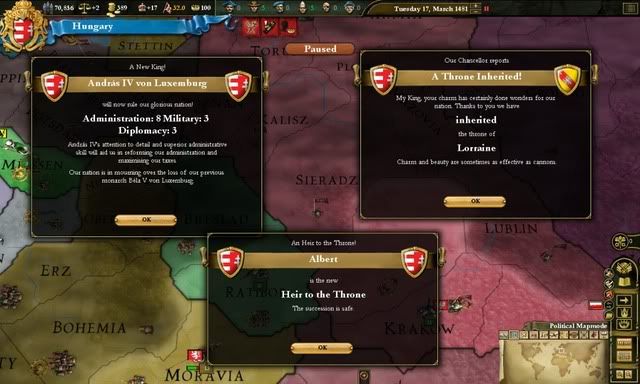
Andras von Luxemburg, son of King Karoly III, becomes King of Hungary.
When word arrived to Andras von Luxemburg that Bela V, his power mad Uncle, had died from the plague in Cantabria he wanted to rejoice but knew that it was now his duty to take over as the new King of Hungary. Even though he had spent the past twenty-six years of his life with his cousins in Sweden it was now time to return to Hungary. No longer would it be a place of shame but he would see that the work of his father and his grand-father would be rebuilt.
Returning to Pecs on the 1st of April the King was met by the Bishop of Avignon Gregorius XII who informed him of two important things. First the people of Lorraine had abandoned their old country and were now a true part of Hungary and more importantly the Pope no longer considered the King's of Hungary men who were against god. Both of these news brought warmth to his heart. In an attempt to show the people that he was not like his Uncle he once again made Pecs the capital of Hungary before sending word to Albert, his younger brother, to return from Luxembourg and take up his position as Prince of Hungary and heir to the throne.
Unsure where to start in fixing the country he knew that he had three main goals. First he would need strong allies, second he would need to find a strong leader to take over the Iberian lands, and third he would need to find a way to make friends with the minor Greek states in the southern Balkans.
His first chance to make allies came when a messenger arrived from the Bohemian Emperor requesting the lands of Lothringen which King Andras IV was happy to agree to. Following this request he began sending out gifts of gold to as many kingdoms as he could. Soon Poland, Bohemia, The Palantine, Brandenburg, Cologne, Aragon, and Alsace were all on good working relations with him. The only person that completely ignored him were the nobles of Austria who were leading the government following the late Kings death. These men would send insults and threats to him on a weekly basis. Finally on the 1st of April he had enough and sent a large sum of gold to a man by the name of Ludwig Scuerzapff. With this money he quickly amassed a force of 16,000 soldiers and started rampaging across all of Austria in an attempt to take the crown for himself.
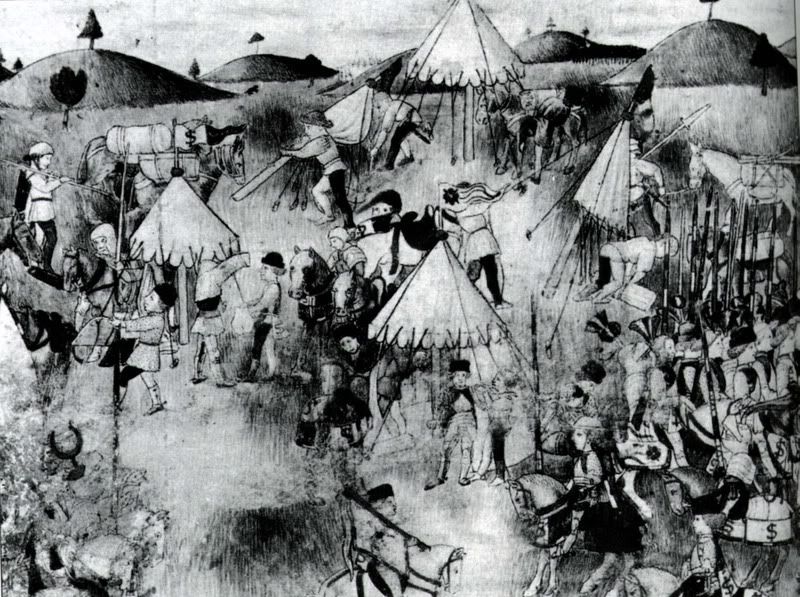
Scuerzapff's Rebel Army
With an ally now in Austria and many of the other nobles and monarchs in the world now friendly with him King Andras now thought of ways to accomplish his second and third goals. He had sent his younger brother Albert to Iberia for the time being but Albert was not an administrator in any sort of way. As for the Greek states he could not get them to see eye to eye with him for some reason. For ten years he tried to get them to become friends of his and Hungary but they just continued to refuse.
Finally on the 5th of May 1491 he could not take it any longer and sent his army south to deal with them. He had no knowledge of combat and so he appointed a minor noble by the name of Domotar Kemeny in charge of the army. Making his way south the General quickly routed the army of the combined army of Byzantium, Morea, Espirus and Achae who stood against him. As he outnumbered them nearly 4 to 1 the battle wasn't all that difficult. His speed at conquering these nations was impressive though. Marching from Macedonia on the 23rd of December he had all the land from there to Morea in the far south under his control by they 24th of March. In three months he had taken over the entire land of Greece.
Following this great success King Andras forced the Byzantine Emperor to release the people of Athens to become a free Greek state. These people led by King Georgias I Phokes proved to be very capable and by mid July of that same year the Byzantine Emperor surrendered Cofu to them and abandoning his throne to return to the countryside. Then in November of that year General Kemeny returned from Morea with word that their King would from this day forward act as their vassals and do as King Andras commanded.
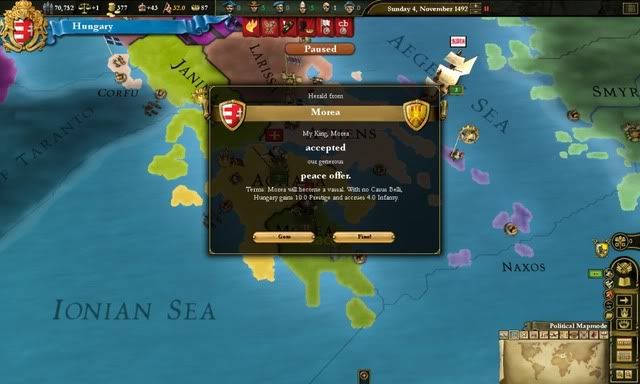
Morea joins Bavaria, Avignon and Montenegro as a vassal to Hungary
With the war over in the Balkans King Andras is greatly pleased with his General and so decides to name Domotar Kemeny the new Chancellor of Iberia. The man had accomplished his third goal as King and so it was only right he reward him. Sending word immediately to Albert, General Kemeny arrived to find that he was greeted with much respect and kindness. In an attempt to gain more support with these states he found himself in charge of he allows the local leaders to have more control which the people greatly appreciate. On the 27th of September in 1493 the people of Galacia present to General Kemeny a magnificent white stallion and a mace which had been owned by their local hero, General Bathory.
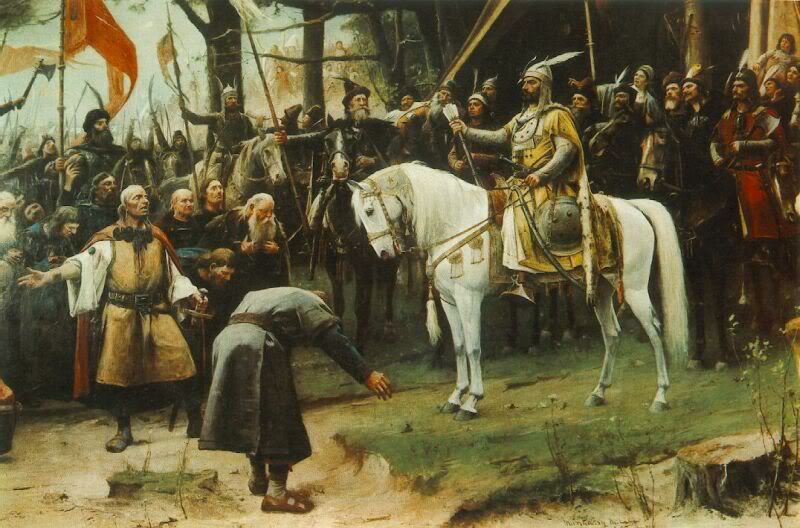
Domotar Kemeny being presented with gifts from the people of Galacia.
These celebrations were cut short though when word came from Hungary. After only twelve short years as King, Andras IV had passed away. Though he was only King for a short time compared to the past three monarchs he had accomplished his goals and set the country down the right path. However, will the Warrior-King Albert I continue this path or will he follow in the steps of such men as General Meszaros and King Bela V bringing more problems to the people?
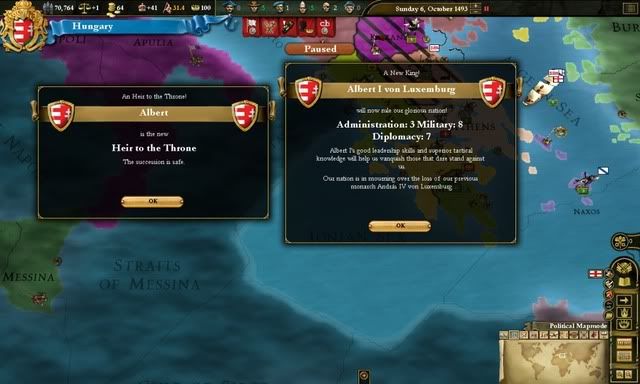
A New King Emerges. What will he bring to Hungary? War or Peace?
That post was pretty difficult to do. I mean I had five things written down for those 12years. (Bela's dead/Andras is King; Bohemian Emperor requests Lothringen-Accepted; Ludwig Scuerzapff 16,000 man rebellion for Austrian throne, War against Byzantium-Greece becomes own state and Morea becomes vassal, Andras died)
Chapter 12: Austro-Hungarian War
With the death of Andras IV the younger of the late King Karoly III's sons find himself on the throne of Hungary. As his elder brother bore no children and neither did his Uncle he was surprised to find himself in such a position. He assumed he would spend his days fighting for more authority in the minor nation of Luxembourg their families homeland. As fate would have it though he was given this great opportunity to bring glory to his family.
At this same time in Iberia the people believed they could rise against him. Many of the Iberian people hated him after his decade rule in those lands and when word came that he was now their King a revolt began to build. It took them quite some time but in January of 1496 a massive revolt broke out in the former capital of Hungary, Cantabria, and another minor one in Leon.
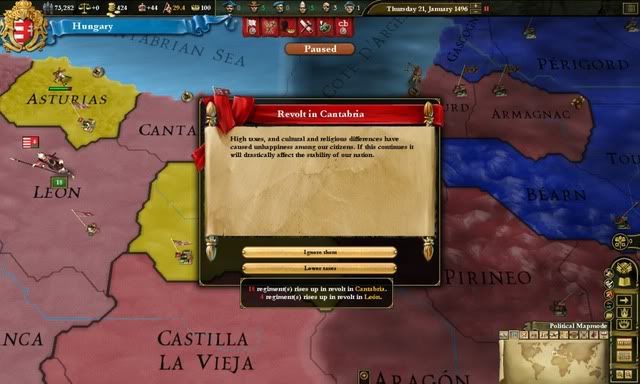
The Iberians try to take back their lands.
General Kemeny who had been stationed in Iberia following his success in the Balkan Wars had chose Leon as his place of duty as this would let him get to anywhere in Hungarian controlled Iberia quickly. When word came that 4000 peasants were camped a little ways outside the city he quickly ordered his force of 18,000 men to prepare to capture them. In just under a few hours he successfully had a force of 6,000 men positioned on all directions that the rebels could escape from. Sending the 6,000 men in from the east the men fought for a time but in the end the rebels tried to flee north and south to escape to fight another day. These men however were slaughtered when they were ambushed by these other men. By using these tactics he was able to slaughter every single peasant while only losing 127 of his own men.
Though many of his commanders thought it was a cowardly move they soon changed their tune when word came of the rebellion occurring in the north. These men were not peasants but former soldiers and nobles from Castille, Aragon and Portugal who were growing tired of the rising Hungarian influence in the region. Their numbers were in the eighteen thousands from the reports he received and they had began the siege of Cantabria. Knowing the city would not be able to hold on for to long General Kemeny gave the orders and the entire army began their march north.
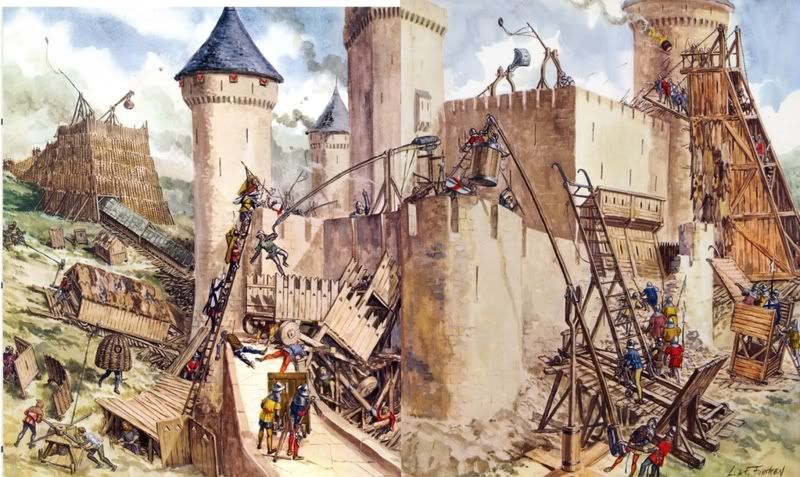
What General Kemeny and his men saw when he arrived outside of Cantabria.
Arriving outside of Cantabria towards the end of May, General Kemeny was worried that the city had already fallen but it had not thankfully. Giving the order Kemeny and his men quickly made their way towards the besieging forces who had given up on the siege to first deal with the new arriving army. As the battle ensued it looked as if it could go in either direction. That is until the enemy forces started to act irrational and begin to flee in every direction. Cutting down as many men as he could the enemies death count was more then ten thousand while he had only lost but 1500 men. Returning from his pursuit of the rebels he learned the cause of the enemies behavior.
The man who had taken charge of the city when it fell under siege had rounded up a thousand men and horses and charged out of the city striking the enemies rear at the perfect opportunity. This charge killed hundreds of their soldiers and their commanding General. General Kemeny was so pleased with this man's actions he sent him to Pecs to go before the King where he was then knighted and given command of an army in Hungary.
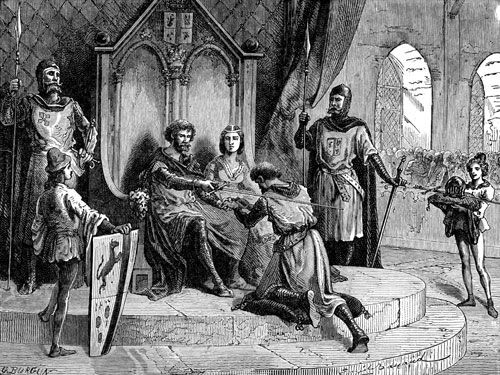
Andras Bocskay being knighted.
With peace returned to Iberia and the people of Hungary happy, King Albert I had very little to do. Though word had spread of a manuscript having been written in northern France called 'The Institutes of the Christian Church'. This manuscript had many people furious especially Pope Pius II who wanted the man who wrote it found and killed as it spoke out against the Catholic Church. Luckly for King Albert he had little to worry about as his people were good Christians and would not accept such heresy in their hearts.
Though he did have one difficulty though following the rebellion in Cantabria. For years now the von Luxemburgs and the von Habsburg's fought over who's house was the most influential. They still argued over who Graz should belong to. The Austrians believed it should go to them since it the Mad King who stole it from them. Where as the Hungarians argued that it was theirs by right of conquest. With this continued conflict rising the King of Hungary was forced to react and on the 1st of November 1499 he declared war against the Austrian King. The Bohemian Emperor who was still but a child of 7 chose not to take sides in this conflict as it was between these two great houses and he knew that should they some how come to terms they would easily crush his much smaller kingdom.
Recieving the orders to attack Austria the newly appointed General Bocskay was a little worried. He had only just taken command and he had only a small amount of experience but still he took his 15,000 men and laid siege to the northern city of Ostmarch. After only a day though word came that an Austrian army of 17,000 men had arrived from Wien and were being led by the Austrian King, Karl II Joseph Habsburg. Preparing his men he left a small force of two thousand men behind to watch the city as he would not fall to the same tactic that he had used years ago. This however left him drastically over matched. Unsure what to do he decided that the best option would be to just attack. So as the enemy army was closing in he gave the order for his men to charge and leading the charge himself he smashed into the enemy army.
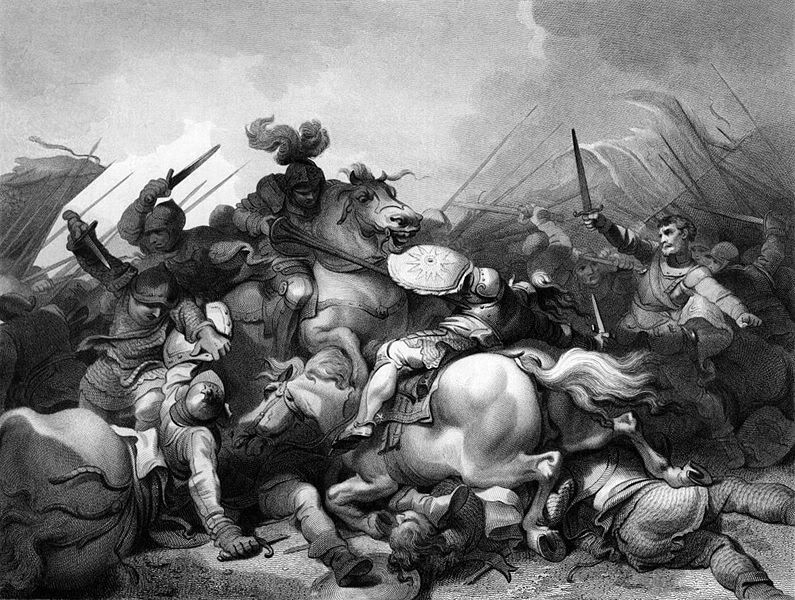
General Bocskay leading a charge into the Austrian army.
This to his great suprise turned out quite effective and it sent the enemy army retreating south. Worried that the King would be able to rebuild and army quickly General Bocskay pursued the enemy through Wien and into Steinmark before he was finally able to destroy the last of the Austrian army and capture their King. He then went on to capture Steiermark before moving north to take the Austrian capital of Wien. At the same time King Albert I finally arrived and after taking Karnten with his force of 20,000 men he made his way to Linz. His success in Linz however was long coming since it was not until the 17th of September did he take the city while General Bocskay was able to capture both Wien and Ostmarch during that time.
With the eastern lands of Austria in his hands King Albert offered King Karl II the chance to end the war if he would agree to but three terms. First, he would release the region of Metz as a soverign state allowing Charles Alexandre Limburg be it's King. This was request was accepted. The next was for the lands of Steiermark and Karnten to be handed over to be ruled by Hungary. This too the King accepted. Lastly he wanted peace with Austria. No more fighting over what land belongs to whom as it was obvious in these past two conflicts between them that the Hungarian army was far superior to his. This the King was forced to agree to as well.
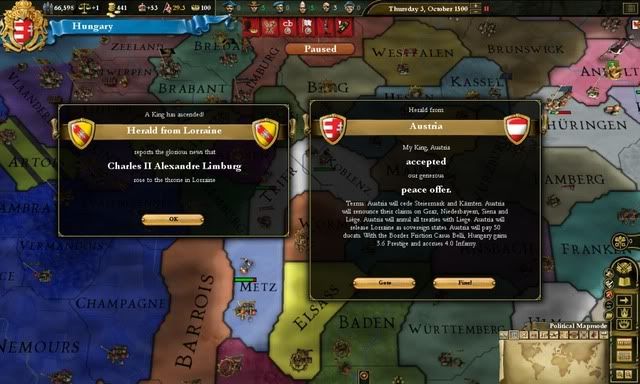
Austro-Hungarian War comes to an end.
With the war over and peace returning to the lands of Hungary, King Albert was pleased to see his that the blade of Hungary was still sharp. No nation had yet stood against the army of Hungary and had prevailed since the days of King Sigismund in the war against Burgundy in the year 1423. For nearly seventy years the Hungarian army had fought and won battle after battle after battle.
His happiness came to end though in the end of summer in 1502. On August 20th a missive came from the Bohemian Emperor Jindrich II who not requested but demanded that he hand over Steiermark to him. Not wishing to take the commands of a ten year old King Albert had the messenger beaten before sending him north to the child Emperor. Though the Emperor wanted to march south against King Albert for his actions he couldn't because guarding his border was an army of 25,000 men under the command of General Bocskay.
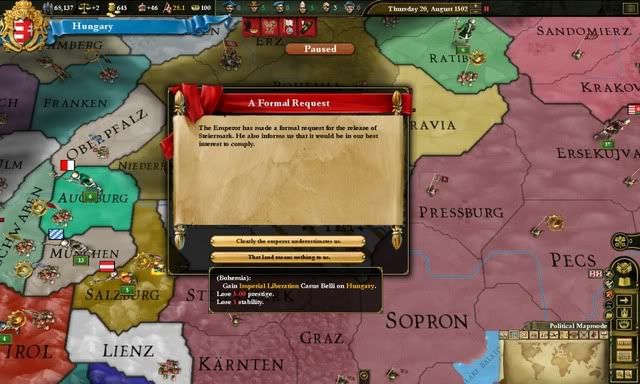
Chapter 13: The Rise of the Protestants, Reformation, and the Luxemburg line
Things were looking up for Hungary again under their new King, Albert I. He had proven himself in combat against the Habsburgs of Austria. Then stood up against the child Emperor of Bohemia. Slowly but surely the land was starting to return to one of prosperity following General Meszaros and King Bela's time in power. This boom though came to a sudden and resounding stop in October of 1502. At last the publication 'The Institutes of the Chirstian Church' had reached his lands. Like a wildfired it spread from Macedonia north through much of his lands.
The people had thrown away their beliefs in the Papacy and Catholicism. They now found God through the works of such men as Martin Luther and John Calvin who stood up against the Pope Pius II. King Albert I found this hard to believe as his lands had followed the Pope from the days of King Stephen I up to Bela V. He was greatly ashamed by his people's actions when they had recieved this manuscript. In his heart he always believed that they would throw it away and see that it was blasphemy.
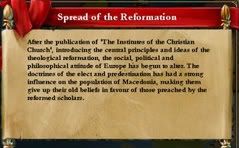
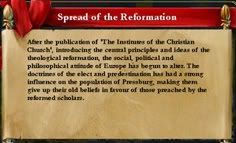
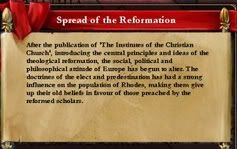
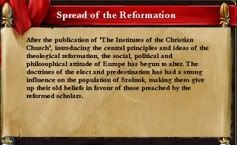
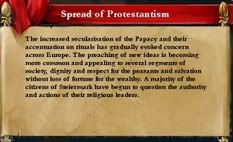
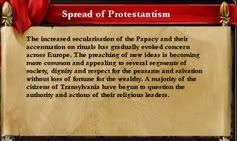
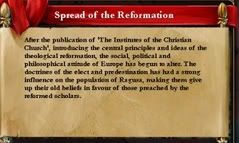
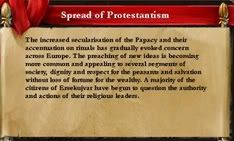
From Macedonia the words spread north to Ragusa and Transylvania and from there it went on to Croatia, Serbia, Szolnok, Graz, Banat, Steiermark, Pressburg, Ersekujvar, Somogy, and the island of Rhodes. In a matter of a few weeks his lands were in a religious turmoil. Some nobles wished for him to abandon the old ways and convert the country to this new movement. This King Albert could not bring himself to do. Instead he decided to stand against these works and attempt to bring his country back under a single proper guidance as it should be. So on the 18th of October 1502 he passed the Conventicle Act which prevented any group of more then 5 men to get together for religious studies unless it was authorized by the Catholic church.
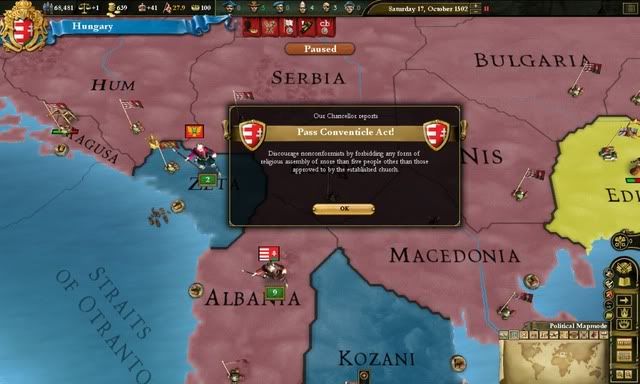
King Albert battles the rise of Protestants in Hungary.
This had worked in slowing the spread of the Protestant movement in his country but he still had to remove these beliefs from the people who already believed in them. That would be a much more difficult job as he had very little support with the nobles at this time. Then in November of 1503 another missive came from the child Emperor of Bohemia 'requesting' the lands of Karnten to be handed over. Once more he had the messenger beaten and returned to Bohemia. This act had once again wanted the Emperor to march his army against the Hungarians but General Bocskay still guarded the lands between these two great countries and though he was but a child his nobles would not allow him to declare such a war.
Over the next few years the Protestant and Reformation movement spread further across all of Europe. Unsure what to do Pope Pius II decided to hold a council in Arnhem. This council was to find ways to battle this recent plague which had spread across most of Europe. In an attempt to bring himself further in the graces of the Pope, King Albert I was the first of the many Kings of the land to support the recent reform suggestions.
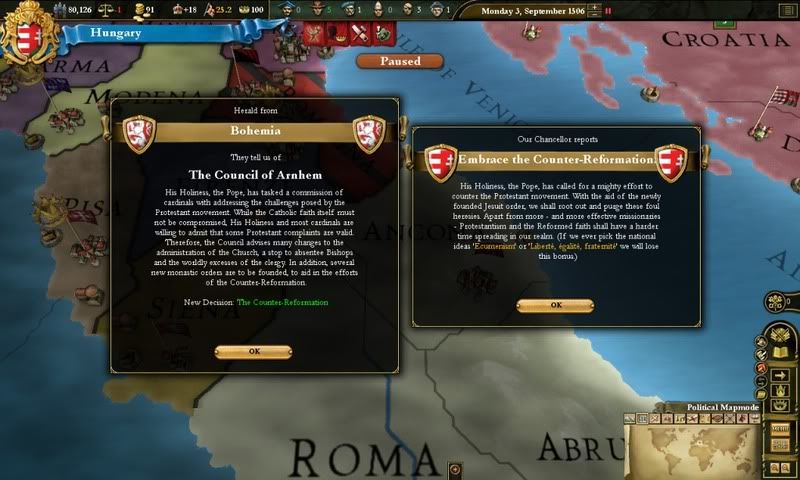
Pleased with King Alberts efforts the Pope pushed for more land to fall under the Luxemburg family. It was obvious that these men were good Catholics and so first the lands of Morea was to be led by Demetrios III von Luxemburg and then shortly after the King of Naples passed away too. Though Naples had fallen in power over the past few years they were still the southern guardians of the Papacy and there were no other family that the Pope could think of he coult trust more in protecting him. And so on the 21st of June 1509 Alfonso von Luxemburg was crowned the first Luxemburg King of Naples and Guardian of Italy.
Just to let you guys know there are only two more chapters left to be written before this AAR will come to an end. Hopefully you enjoy them. Once I finish these two chapters I will then make a prologue post which will be a brief explanation of what happens in the years to follow in Hungary.
Chapter 14: Fighting for Catholicism
So the lands of Hungary and all of Europe for that matter had been struck by the recent demands of the people. No longer do they wish to serve the Pope and be forced to be either Catholics or heretics. Among the many leaders across Europe one stood out above all else as a beacon of the one true faith and that man was King Albert I von Luxemburg, King of Hungary. After many rewards for his duty among them a stronger position for his family across the faithful regions of Europe, King Albert passed away on the 9th of August 1510. Leaving behind only one child by the same name to take up the throne and his cause. In honor of his father, Pope Pius II left Rome and came to crown Albert the younger in Pecs.
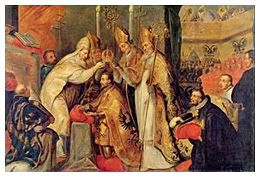
Pope Pius II crowning Albert II in Pecs.
Taking his father's position as King of Hungary, Albert II made his only son Ulaszlo his heir. His first few years as King he did very little except attempt to reestablish diplomatic connections with the other major powers of Europe. Most important of these were The Palantine, Cologne, Alsace and Brandenburg all of which were electors for the positon as the Holy Roman Emperor which was still held by Emperor Jindrich II. Though the Emperor was still young it was obvious he would not live for to much younger as he was often sick and Albert II was fighting for a claim to the throne along with King Karl II Joseph Habsburg of Austria and Jindrich's younger brother Zikmund.
This time of peace though came to an end in October of 1512 when word came from his ally Connacht of Ireland that the people of Munster were attacking them. Agreeing to come to their aid he quickly sent his fleet from Rhodes to Galacia to pick up a detachment of 10,000 men to go and aid his friends and allies. Arriving in mid-January he came to learn that they were no longer in need of his services as the English had arrived in Munster quickly taking over their government and claiming the lands for themselves. With no real cause to be there the soldiers sailed back to Galacia and returned to their duties in Iberia while the navy stayed patrolling these lands instead which had recently seen a large number of pirates.
Taking a detachment of soldiers south to meet with the King of Greece, King Albert II learned that a revolt had occured in Transylvania. These men refused to convert back to Catholic as they believed they had found their true faith. Seeing this as his first chance to prove himself as King and as capable as his father the King ordered his force of 10,000 soldiers to divert their course and march east to destroy this revolt. Upon arriving in Transylvania the battle went well and the five thousand peasants who had revolted were killed to the man but the King was not to be found. Later in the day they found him dead and stripped of his armor and belongings. King Albert the Younger had passed from this world at the young age of 23 and with only serving little less then three years as King.
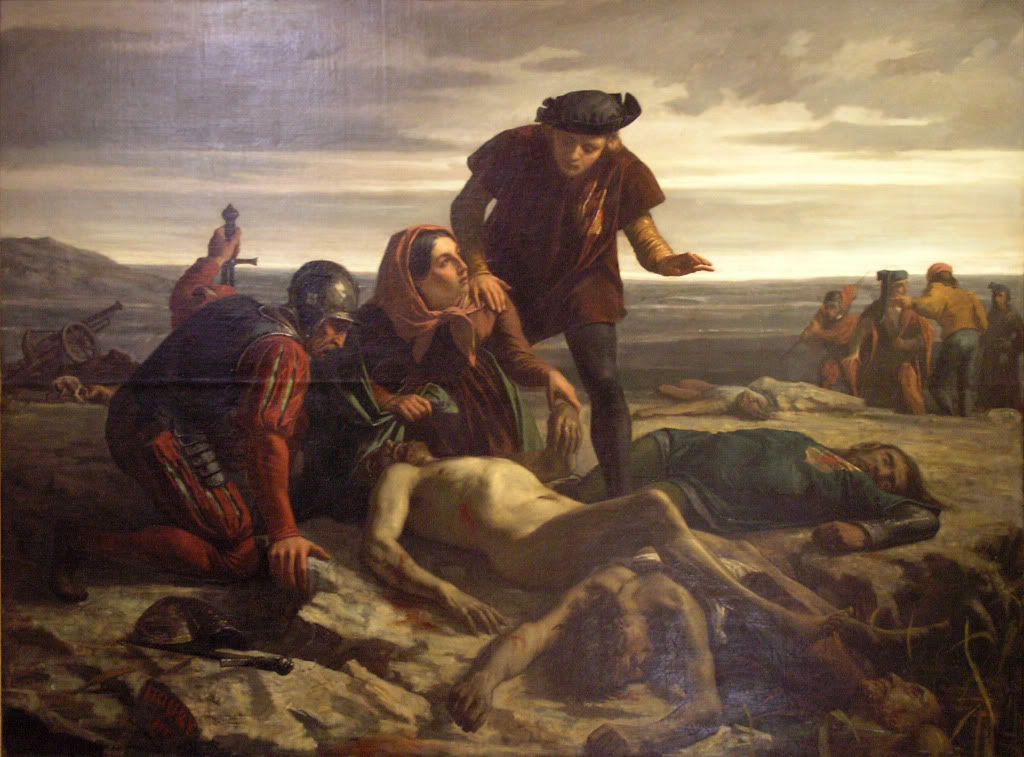
King Albert the Younger's corpse.
On the 5th of March 1513 a Regency of Hungary's nobles were formed to protect the lands til Ulaszlo, King Albert's son was old enough to take his father's throne. At only 2 years of age it would be many years before he would be in such a position and the nobles hoped they could do what they could for the King until that time came.
These nobles were men from Pecs, Carpathia and many from Iberia where the Catholic faith was still strong. They would see the lands rid of heresy and those who did not serve the one true faith. Their first act was to make it a requirement for all people to attend Catholic Church on Sundays. Any man, woman or child who did not attend was breaking the law and would be fined. This act brought in both more wealth and forced the people to return to the Catholic church.
Though the Regency council wished to bring more lands to Hungary they knew that they could not make such a decleration wish a child King. So instead they decided it would be best to instead send a force of soldiers south into western Africa and colonize these lands. They did not have to make any decleration of war against these tribes and so they began their first colony on the 25th of December 1516 at Trarza. This land was just south of Portugese controlled Africa and north of the great tribe of Mali. With their colony started and the Catholic church beginning to prosper again many local artists assisted in building new churches that were very lavish. This was a Golden Age of Hungary both by it's prosperity and by the fact that many of the churches had more gold in it then some countries entire coffers.
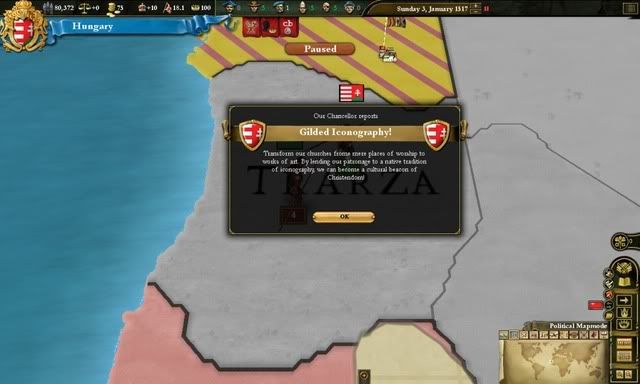
The 'Golden Age' of Catholicism has begun.
With the building of more churches and an attempt to bring lands in Africa to Hungarian rule the people of Protestant and Reformation faith found this a great place to get away. If they left Hungary and Iberia they beleived they may find a home in Africa where the King would let them live their lives and they would no longer be forced into going to Catholic churchs. This they learned was not true but for the time being they found a place to live on their own for a short time.
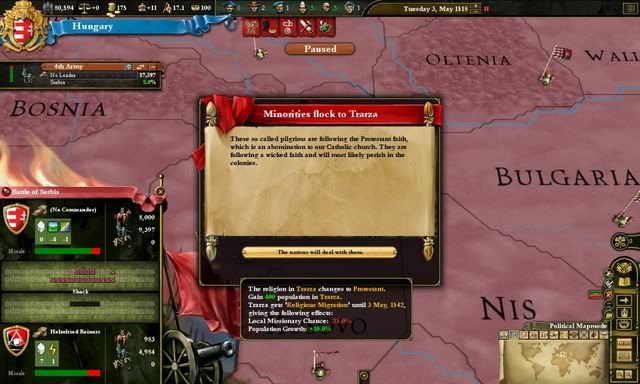
Four hundred Protestants flee to Africa
With so many men now in Trarza the Hungarian army marched east and claimed the area of Brakna for their own as well. This was the last of the land in this region that was not controlled by the Mali or the Portugese. Both of these regions proved very valuable though as Trarza had very good soil that was good for producing grain and Brakna was covered in elephants and so ivory became a major export of this region. By the end of the year 1520 both of these regions had enough people to be considered full provinces in the lands of Hungary and no longer were people sent away to populate this region.
On the 28th of June 1521 at the age of eleven Ulaszlo fell ill from a mysterious disease which had come from the lands of Africa many suspected. For months the young King was ill and many feared he would pass away leaving nobody in charge of the country except the power hungry nobles. Luckly by the beginning of the next year the King was back on his feet and only had four more years before he would be crowned King on his sixteenth birthday.
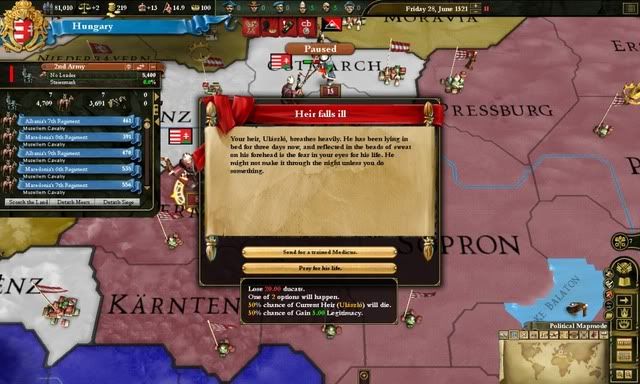
Fear spreads across the country when the people learn of the young King's illness.
After another year of peace the Hungarian army is called on from the King of Greece who needs their assistance in bringing more of the southern Balkans under their guidance. Agreeing to send aid to the Greeks an army of seven thousand men are sent south to aid the Greek King against the Epirus. With these extra soldiers he was able to quickly bring the King of Epirus to his knees and on the 20th of January 1524 Greece annexed their lands. The leader of these seven thousand soldiers who had marched south was the Regent Andras Bocskair who upon his return suggested that they should kill Ulaszlo and make him the new King of Hungary. Furious with this man's proposition the people quickly had the man bound and gagged and brought before the young King. Many thought he would have the man killed but instead he had him sent across the Adriatic Sea to Apulia. From this day to the man's last he would work for one of his cousins Alfonso I, King of Naples in his salt mines.
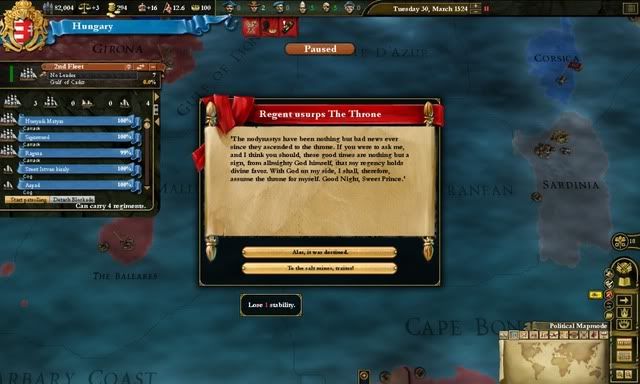
Ulaszlo shows mercy to Andras Bocskair.
Pleased with their furture King's reaction to the noble Bocskair's attempt to the throne they regave their oaths to him even though they did not have to until his coronation. Later that year Ulaszlo who had just turned fifteen had his first child who he named Bela. Many were suprised by the choice of names since the last Bela who had been King had brought nothing but pain to the lands of Hungary. Ulaszlo though argued that he would not let such a powerful name be dishonored by one of his ancestors. He would teach his son right and when he took the throne he would see that he would bring honor back to the name. In honor of the King's Bela III and Bela IV both of which had been truly great Kings of Hungary. Once more he had proven to his people that he was a good man and a worthy King. And so on the 10th of August 1526 on his sixteenth birthday Ulaszlo was crowned King of Hungary.
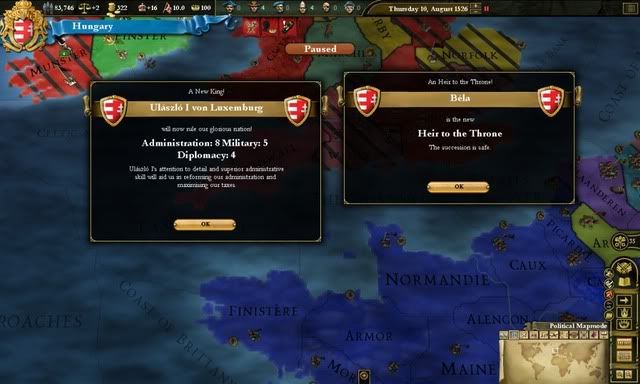
Ulaszlo I takes the throne as King of a strong united Hungary.
Last edited:
Chapter 15: God Save the Emperor of the Romans
Taking the throne of Hungary in August of 1526, King Ulaszlo finds himself in a very strong position. The only thing he is really missing is gold and the respect of the army. In an attempt to prove himself to his men Ulaszlo leaves Pecs and makes his way by ship to the Hungarian provinces in western Africa. With him he brings just a small force of around two thousand soldiers to add to the twelve thousand that are already stationed there. Arriving towards the beginning of the year Ulaszlo takes his time and decides to first become better known to his men and learn more of the land. Just as he thought most of the land in this region controlled by the Mali tribes were nothing more then a few huts and no real fortifications.
This would make the western regions easy to take as he would only really need to worry about the regions near their capital for sieges. Finally on the 1st of February of 1527 he made his intentions known to the Mali tribes as he made his way south from Trarza with his army of 14,000 soldiers and swept across their western lands. Though it was a large amount of territory he had to take it was well worth it as tribe after tribe fell to him with very little resistance. It was not until August of that year that the first real army came to move against the Hungarian forces. This army was led by Momadu III Coulibaly who was the Tribal Chief of the Mali.
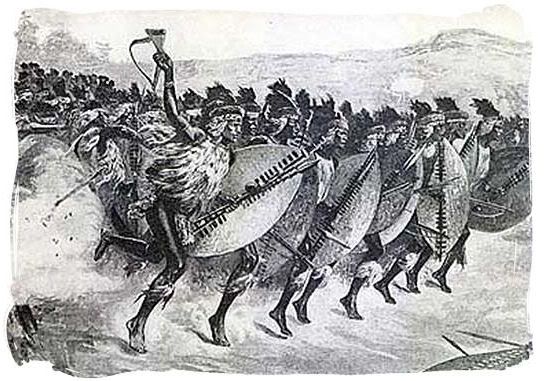
Momadu III leading the charge against the Hungarian forces.
Positioning his men in their ranks Ulaszlo was not surprised to see that even though their numbers were almost equal there was no real unification to the Mali army. There was no real discipline and they did not have any real armor either. Besides the large shield they carried made of what appeared to be straw they had nothing else. Ordering the attack the two forces clashed for many hours and in the end it was obvious that the Hungarian army and it's cavalry put the Mali tribes in their place. With the advantage of armor and mobility the Hungarians only lost 300 men and massacred more then seven thousand of the enemy soldiers. As they fled the field of Futa Jellon they were soon picked off man for man in the province of Bambuk.
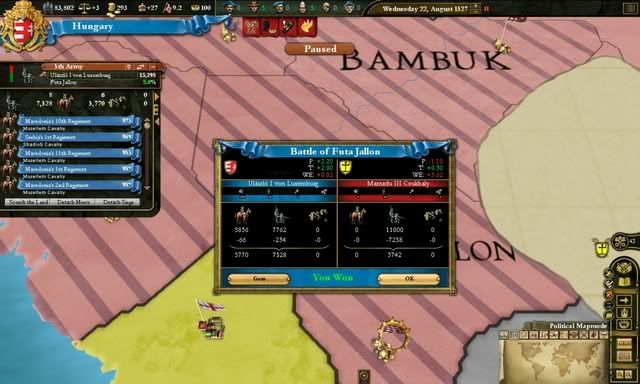
Ulaszlo I and his cavalry massacre the Mali Tribal warriors.
With their entire army dead Ulaszlo had very little difficulty in marching across the rest of their lands and taking each province. Though this would take some time as he knew very little of the land east of Bambuk and so they would have to send out scouts and make better maps so he would not lose men to the elements nature. Finally in November of 1529 the last of the Mali lands were taken. Though he considered taking the land he had conquered for himself Ulaszlo instead chose to take all the gold that the Mali had. This two year raid brought in nearly two thousand pieces of gold into his personal possession making him the wealthiest King in all of Europe.
Returning to his home in Pecs the following year the King used this gold to build him a stronger army. One that he was certain could defeat any that stood against him. Wishing to put this to the test he declared war against the Bohemian Emperor Zikmund I von Mecklenburg who had inherited both the Bohemian throne and that as the Holy Roman Emperor. Bohemia though had many allies among them were Aquileia, Castille, Switzerland and Silesia who took up the sword against the Hungarian King.
One by one each of these lands fell to King Ulaszlo. First Aquileia fell out of the war when all the lands east of Venice were taken. Next Switzerland who feared the Hungarian army that marched from the lands of Aquileia. Then came Silesia who agreed to cut off all ties to the Bohemia Emperor. The last of those to surrender was the Castilians who were forced to surrender Asturias back to Hungary which had been lost for more then 100 years and had changed hands countless times between Kings.
It was not until September of 1532 that Bohemia was forced to concede defeat. The Hungarian King was merciful though who only took the land of Moravia and had Corsica released from Bohemian control. Emperor Zikmund though demanded Moravia back towards the end of the year which the King's only reply was laughter.
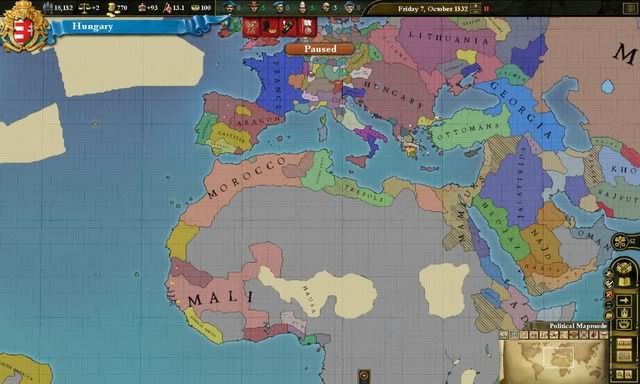
Hungary following the Bohemian conflict.
Having proven himself as a champion of Catholicism through the acts of the Regency and the recent war against the Protestant Bohemian Emperor King Ulaszlo found that many of the recent additions to the college of cardinals were all from his lands. Almost every three months another man was placed among these other cardinals until finally nearly half of them were of Hungarian decent and King Ulaszlo was known throughout the land as the Papal Controller. Unlike other Kings over the past few years he did not abuse this power and instead continued to fight for bringing Catholicism back to the people of all of Europe.
In the year 1536 Ulaszlo running low on gold decided it was now time to once again pay the tribes of Mali a visit in an attempt to increase his wealth. King Ulaszlo decided not to march into battle again as his he had felt poorly over the past few months and stayed in his home in Pecs instead. On the 3rd of September of 1537 after only 11 years following his coronation King Ulaszlo passed away. In his place his eldest son Bela took the throne and named his younger brother Ulaszlo as his heir since he had no children of his own.
With the war in Mali going well Bela decided to instead stay in Pecs and increase his relations with the different Electors of the Holy Roman Empire since Emperor Zikmund was growing old they would soon need a new Emperor. At this same time all of Hungary had finally converted back to Catholicism.
It was not until 1540 that the war in Mali came to and end and once more the land was bled dry of its gold. This time King Bela was able to acquire close to 2500 pieces of gold which he quickly put to use in buying the votes of the people of Cologne, Alsace, The Palantine, and Brandenburg. He was also able to use this money to bring the throne of Pommerania back to the von Luxemburgs. It was at this time that his wife had their first child a son by the name of Istvan. Though he now had an heir he thought it best to leave his brother as heir to the throne until Istvan came of age.
3rd of July 1542 King Bela VI of Hungary named after the great King Bela IV who had rebuilt Hungary following the Mongolian invasion was crowned Emperor of the Romans. Emperors Henry VII, Charles IV, and Wenzel were the only other men of House Luxemburg that held this title and this was the first time that a Hungarian King had been named the Holy Roman Emperor. With this crown also came the Island of Osel in the north and Frarche-Comte which gave him lands in the west to defend against the ever-growing France that had taken Protestant as their nation religion.
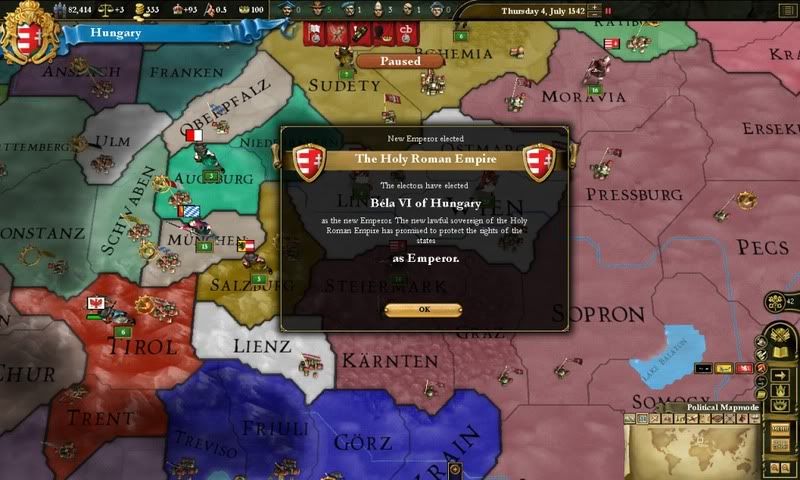
Bela VI is crowned Emperor of the Romans and brings honor back to the name of Bela in the eyes of the Hungarian people.
So that is the technical end of my AAR. I reached my goal to become the Holy Roman Emperor. It only took 143 years but I reached it. ^_^ I hope you guys enjoyed reading this AAR. I should have the epilogue up in the next week or two. So far I'm up to the year 1570.
I plan on having the epilogue be a brief desciption of what happens during Bela VI, Ulaszlo II, and the next few Kings after thats reigns. If there is any questions about anything I've written or what happens after feel free to ask.
I plan on having the epilogue be a brief desciption of what happens during Bela VI, Ulaszlo II, and the next few Kings after thats reigns. If there is any questions about anything I've written or what happens after feel free to ask.
A short but high quality AAR; I'm pleased to say I've followed this since the very beginning. I'd be interested to see what your next AAR will be, if any. Good work!
I'm glad you enjoyed it Avindian. I know it was kind of short but since it was my first real AAR I just wanted to test the waters. My next AAR is something that me and Eber worked up. He helped me with the idea but it wont be up for quite some time. Since I have to play the entire game before I make the first post. I plan on making a character AAR where it's a Japanese dad that is telling bed time stories to his son. Each chapter will be another story for his son. This will not be started for some time and it will be much longer and in more detail in regards to battles, advisors, and things that are going on in Japan. ^_^
Epilogue
Following his coronation as Emperor of the Romans, Emperor Bela went on to claim the throne of Bohemia where after a year and a half of fighting he had taken the Bohemian throne for himself and brought the army of Poland to it's knees as well. From here he went to force the lands of Utrecht and Mecklenburg to become his vassals before bringing another war against the Mali to gain more wealth for the vast armies he is building in the north. This time though he split the Mali tribe in half taking a large amount of their land for himself making the Hungarian influence in western Africa the strongest of all the nations and tribes.
Believing he was now strong enough to face any land in the world with his army he chose as his next target France in an attempt to crush the one other power in Europe that could stand against him on the field of battle. This war taught him though the strength of the musket. He was still using horse and foot while the French army was equipped with muskets that quickly ripped through his men and so this war was cut short but he was still able to bring Paris to it's knees forcing the nations of Alencon, Bourbonneis and Foix to be released. This would be the end of the reign of Emperor Bela VI though. His son Istvan was still not old enough to take his throne and so instead his younger brother Ulaszlo took the Hungarian and Bohemian throne as well as being named the next Holy Roman Emperor.
With the coronation of their new King the nobles quickly made an attempt to gain more land and privilages from the Hungarian throne and the church itself. This Ulaszlo declined and had to put down many revolts at the beginning of his reign to keep these men from seizing power for themselves. However once these men had been put down he went on massive campaign across all of western Africa and much of Europe. This campaign began in Africa where he brought the Mali tribes and Songhai down forcing both to give him all their golds. With this wealth he was able to beginning his attack on Poland which King had just passed away and the great Union of Poland, Thuringia and Lithuania had come to an end. This war lasted another year that would force much of northern Poland into Emperor Ulaszlo's hand and eastern Poland now became the lands of Crimeria and Ukraine.
With this victory he then moved on to a campaign that would stretch across all of northern Europe. In this campaign Brunswick, Anhalt, The Hansa, Meissen, Munster, Brabant, Luneburg, Riga, Magdeburg, Gelre, Denmark, Flanders, and Saxe-Luneburg all stood against Emperor Ulaszlo II but one by one each of these men fell to his vast armies which had now become equipped with muskets. Anhalt, Brabant, Munster, Gelre, Meissen, Magdeburg, Brunswick, and Luneburg were all forced into vassalship to Emperor Ulaszlo. No body could stand against him and soon The Hansa and Denmark agreed to make peace with him.
During this campaign in the north the Songhai tribe tried to take back some of Mali's lands but this turned out against them as in only two months time there entire army was destroyed and the lands were annexed. Pleased with himself Ulaszlo II von Luxemburg decided to reform the Hungarian lands into a vast Empire that stretched acrossed most of the land. This though would turn out to be his undoing though. This brought great anarchy across his lands and tired of all these wars revolts popped up across the Empire. Many regions then ceded from the Hungarian throne to become their own nations and Ulaszlo was left with only the few lands that King Sigismund had originally taken for himself except for the lands of Croatia that is. It was then on the 17th of September 1592 that Emperor Ulaszlo died without a son and Istvan had passed a few months before that leaving no Luxemburg in line for the throne.
So with his death in 1592 the House of Luxemburgs had crumbled from the strongest family in all of Europe to only leading the small provinces of Morea in southern Greece and Brandenburg which had recently lost all of it's lands except for one province to the ever growing Prussians in the north.
Since Ulaszlo died without an heir I thought this would be a good way to end this story. I hope you all enjoyed it and I hope you continue reading my AARs.

